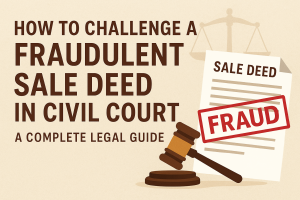In commercial and financial transactions, recovery of money often becomes a major challenge when parties default on payments. To ensure speedy justice in such cases, the Code of Civil Procedure, 1908 (CPC) provides a special mechanism known as a Summary Suit under Order 37.
This provision enables the plaintiff to obtain a quick decree without going through the prolonged process of a regular civil trial.
What is a Summary Suit?
A summary suit is a fast-track legal remedy designed for cases where the defendant has no genuine defence. It allows the plaintiff to seek recovery of a definite sum of money arising from written contracts, bills of exchange, promissory notes, or other acknowledged liabilities.
The procedure minimizes delays by limiting the defendant’s right to contest unless the Court grants leave to defend.
When Can a Summary Suit Be Filed?
A summary suit can be filed when the claim relates to:
-
A written contract (such as an agreement, invoice, or acknowledgment).
-
A bill of exchange, promissory note, or cheque.
-
Fixed debt or liquidated demand in money arising from a contractual obligation.
It is particularly useful for businesses, suppliers, contractors, and professionals seeking recovery of unpaid invoices or dues.
Procedure for Filing a Summary Suit under Order 37
-
Institution of Suit:
The plaintiff must clearly state in the plaint that the suit is filed under Order 37 CPC, mentioning that it falls within the scope of the order. -
Summons for Appearance:
Once the suit is filed, the Court issues a summons to the defendant directing them to enter an appearance within 10 days from the date of service. -
Leave to Defend:
The defendant can only defend the case after obtaining the Court’s permission (leave to defend) by disclosing facts that may constitute a valid defence. -
Decree in Default:
If the defendant fails to appear or fails to obtain leave to defend, the Court may pass a decree in favour of the plaintiff immediately.
When Will Leave to Defend Be Granted?
The Court will grant unconditional leave to defend if the defendant shows a bona fide and substantial defence. However, if the defence appears vague, frivolous, or an attempt to delay proceedings, the Court may:
-
Grant conditional leave (for example, deposit of part of the claim), or
-
Reject the leave to defend and pass an immediate decree.
Advantages of Filing a Summary Suit
-
Expeditious Disposal: Faster than ordinary civil suits.
-
Limited Defences: Prevents frivolous litigation and delay tactics.
-
Strong Legal Leverage: Encourages early settlement.
-
Ideal for Business Dues: Especially useful for recovery of payments in commercial contracts.
Jurisdiction and Limitation
-
The Court of appropriate pecuniary jurisdiction can hear summary suits.
-
The limitation period depends on the nature of the underlying contract or instrument (e.g., three years for written contracts or bills of exchange).
Conclusion
Summary suits under Order 37 CPC serve as a powerful legal tool for ensuring timely recovery of legitimate dues. By restricting unnecessary defences, this procedure strengthens the efficiency of the judicial process — providing plaintiffs a quicker and more effective route to justice.
For businesses and professionals facing non-payment issues, initiating a summary suit can often be the most practical and legally sound step toward recovery.



